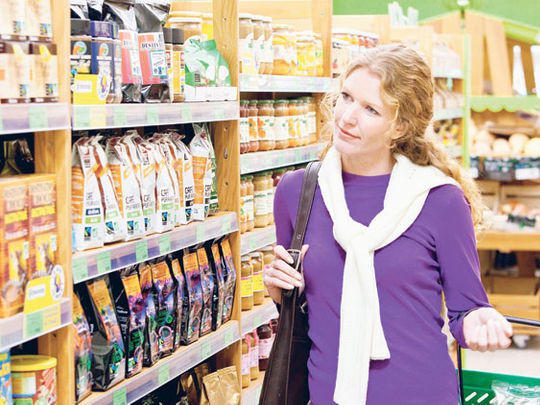
Dubai:The organic goods market in the UAE is benefiting from rising consumer awareness for healthy food. It might have started off as a fad limited in its appeal to a few, but has now been putting in year-on-year growth of 20 per cent and more, easily one of the highest rates recorded within the wider marketplace.
Such is its latent potential, the trend is now pulling in new entrants to benefit from these kinds of growth rates.
In January, Alyasra Food Co started distributing its organic foods to more than 60 outlets in the UAE.
"The reason we began is because we found that there was a good demand as customers opt for products that promote a healthy lifestyle," said Mohammad Khattab, sales manager at the company's organic division.
Health-conscious
"[While] people in general are becoming more health-conscious, it takes time to really have the right knowledge regarding organic food."
According to Khattab, the market for organic food in the UAE is between 5 and 10 per cent of the total demand for food products. Popular organic foods include those specifically targeted at children, as well as fruits, vegetables and dairy products.
With most of the organic products being imported, apart from the higher cost involved in growing them, their retail prices carry a higher premium than the comparable conventional food. The differential could be as high as four to five times.
This is one reason why a survey conducted by YouGovSiraj found 61 per cent of the UAE's residents said they do not use organic food because it was deemed too expensive.
Retailers are working on correcting that impression. "What we're trying to do is not to position our prices much higher than conventional food, try to offer something at a reasonable price," said Khattab.
Other retailers say pricing is only one issue, and that much still needs to be done on brushing up the awareness factor among consumers here. "Awareness of the benefits of organic items is lagging compared to other parts of the world," said V. Nandakumar, spokesperson for Lulu Hypermarket.
"But more recently, a lot of the younger generation is warming to the idea and exploring healthier ways to eat."
Lulu Hypermarket has been stocking up on organic merchandise for nearly four years now, and at 20 per cent annually, sales volumes have closely tracked that of the wider organic sales volumes in the UAE.
"We've been seeing a lot of growth happening, especially in the vegetables and fruits segment," Nandakumar added. "There is much more scope and we hope to promote these much more in our stores."
One way to get organics products on to the shelves at a lower retail price is to grow them locally. The UAE has 13 organic farms with 23 more being developed before the end of 2011. The first farm to be certified was in Sharjah in 2005, which produced organic vegetables and dates.
Guidelines
The Ministry for Agricultural Development is drafting the regulations for federal Law No 5 of 2009 regarding organic products. The law will outline strict guidelines on the production of organic food in the UAE, which, it is expected, will in turn boost the industry's reputation and help it sell locally grown produce.
Trying to encourage the local organic sector, the Ministry of Environment and Water has set a target of 3,000 hectares of agricultural land dedicated to organic farming. But due to the arid desert climate, the production process presents many difficulties.
For some of the smaller farms, running them successfully has proved too costly. "The main issue is that one needs potable water to farm organically, and desalinated water has a very high carbon footprint," said Nils Al Accad, CEO of Organic Foods and Café. "Also, the heat in the summer means that the growing period starts late."
Not surprisingly, demand as of now is principally stoked by the European resident base here who, of course, have been exposed to the whole organic debate in their home countries.
Local retailers then have wasted no time in gearing their strategies accordingly. "We found demand was higher in locations where mostly Europeans with medium to high income live," said Khattab.
"They are aware and know the products from their home countries. In areas like Deira, demand isn't as high."
Within the region, the UAE is the biggest and fastest growing market for organic food. But "awareness is also increasing in Saudi Arabia and Kuwait, we've been receiving a lot of enquiries from those areas," said Khattab.
The list continues to grow…
The burgeoning interest in the organic movement is not confined to food alone. A growing number of UAE residents - not to mention the spas sprinkled across the country - are stocking up on cosmetic products made organically.
"Consumers are becoming increasingly aware of benefits of using natural and organic products," said Ahmad Pauwels, CEO of Epoc Messe Frankfurt, the organiser of Beauty World Middle East. "As consumer awareness over product ingredients increases, so too does the search for easier - and more natural - beauty solutions."
According to Epoc Messe Frankfurt, the global market for both organic and halal cosmetics is now worth Dh29.36 billion. Demand is growing at 12 per cent annually.
The awareness has led to an increasing number of international organic products being launched here. Espai Beauty Supplies, an Australian organic product brand, recently launched in the UAE.
Stefan Zappe, sales director at A Pure Green Source, says while the market is still far behind compared to Europe, the interest is there. "In Austria, the market is very developed," said Zappe. "You can buy organic bread from a petrol station, while in the UK it's big but still growing. Now in new markets like the UAE and India, there are more people asking for organic products.
"Organic products do well here because they are in fashion and carry a good story," Zappe added. "There are customers who buy it because they believe it is important to look after our environment, but more people here buy the product now because it's a trend."
Beyond food and cosmetics, there is even organic clothing. Environmentalists can put their consciences at ease by purchasing organic clothing made from cotton that has not been genetically modified and grown without the use of synthetic agricultural chemicals such as fertilisers or pesticides.
Baby products are also becoming part of the movement through organic mattresses, diapers and toys.
Beauty solutions
The burgeoning interest in the organic movement is not confined to food alone. A growing number of UAE residents — not to mention the spas sprinkled across the country — are stocking up on cosmetic products made organically.
"Consumers are becoming increasingly aware of the benefits of using natural and organic products," said Ahmad Pauwels, CEO of Epoc Messe Frankfurt, the organiser of Beauty World Middle East. "As consumer awareness over product ingredients increases, so too does the search for easier — and more natural — beauty solutions."
According to Epoc Messe Frankfurt, the global market for both organic and halal cosmetics is now worth Dh29.36 billion. Demand is growing at 12 per cent annually.
The awareness has led to an increasing number of international organic products being launched here. Espai Beauty Supplies, an Australian organic product brand, recently launched in the UAE.
Stefan Zappe, sales director at A Pure Green Source, says while the market is still far behind compared to Europe, the interest is there. "In Austria, the market is very developed," said Zappe. "You can buy organic bread from a petrol station, while in the UK it's big but still growing. Now in new markets like the UAE and India, there are more people asking for organic products.
"Organic products do well here because they are in fashion and carry a good story," Zappe added.
"There are customers who buy it because they believe it is important to look after our environment, but more people here buy the product now because it's a trend."
Beyond food and cosmetics, there is even organic clothing. Environmentalists can put their consciences at ease by purchasing organic clothing made from cotton that has not been genetically modified and grown without the use of synthetic agricultural chemicals such as fertilisers or pesticides.
Baby products are also becoming part of the movement through organic mattresses, diapers and toys.
As popularity increases, the list continues to grow.












